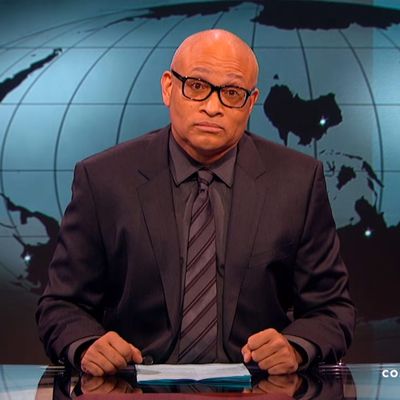
The Nightly Show With Larry Wilmore made an unsteady but very likable debut last night. That’s about as good as anyone can expect from a talk show that debuted on Martin Luther King Jr. Day, and that’s going to spend the next few weeks or months perfecting itself while shouldering the burden of immense and mostly unreasonable expectations.
The circumstances must have been nerve-racking. Wilmore was formerly the “Senior Black Correspondent” of his show’s time-slot lead-in (and still news/talk champion) The Daily Show, and he’s inheriting a spot previously occupied by Stephen Colbert, who just decamped to take over David Letterman’s Late Show on CBS. Wilmore also handed over creative control of the excellent ABC sitcom he created, black-ish, and said that henceforward, he’d be “a full-time cheerleader” for the series and nothing more. If last night’s premiere was any indication, The Nightly Show’s wisest move was to change its title from the previously announced The Minority Report. As Wilmore told the New York Times, ““It was never intended to be a show only about minorities. It’s a show about underdogs, and that happens in a lot of different forms, whether it’s race, gender or whatever.”
Wilmore’s debut as host made good on that promise, especially during the show’s second and third segments, which swapped the by-now-standard, Daily Show–style roundup of headlines and issues plus wiseass commentary for a panel featuring Wilmore, New Jersey senator Cory Booker, comedian Bill Burr, musician Talib Kweli, and writer/actress/model Shenaz Treasury. The dynamic was engaged but laid-back, pointed but not too spiky, at times evoking a mellow version of Bill Maher’s old ABC series Politically Incorrect. Right out of the box, the talk segments dealt with racial and ethnic tension more frankly than anything The Daily Show has done in ages, and more organically.
Wilmore joked during his opening headlines segment that The Nightly Show was debuting a year too late for him to riff on Ferguson, Eric Garner, and continuing tension between minorities and police, but that statement just set up the fact that those issues and others were older than TV and aren’t going away soon. “You look very nice in a suit,” Wilmore told Booker. “Do you ever feel like you’re just a hoodie away from being face-down on the pavement?” When Wilmore asked Burr, “Are white people tired of black protests?” Burr said we should first ask, “Is protesting legal?” because reflexive, often-violent police crackdowns suggest they really aren’t. Kweli took issue with white people responding to the #BlackLivesMatter hashtag with #AllLivesMatter by saying, “You don’t go to a rally to beat cancer and say, ‘All diseases matter.’” These and other points were vital and made for good TV, and they offered multiple entry points into topics that Stewart or Colbert have rarely been able to discuss without sounding as if they were leading white liberal viewers on a sociopolitical safari. Burr, the only Caucasian on hand, lobbed the greatest number of rhetorical grenades, even wondering at one point if “great change” was more likely to come through “ridiculous acts of violence” than through nonviolent demonstrations.
Wilmore seemed more at ease, at times more in command, when leading the panel than when seated behind an anchor’s desk doing the Stewart/Colbert/John Oliver–style headline roundup. Which isn’t to say he didn’t get off a few good bits: He did, starting with his opening Oscars feint, which led into a lament for The Lego Movie’s snub as Best Animated Film, and continuing on through a face-palm for Al Sharpton as spotlight-seeking, social-justice superhero (“You’re not Black Batman”), and a list of non-race-related 2014 protests that got immediate, demonstrable results while anti-police-brutality protests were diminished by some pundits as “unfocused.” He raised a skeptical eyebrow at Grand Central Station protesters: “There’s no better way to win the hearts and minds of white people than making them miss their train to Connecticut.”
Although the show’s opening segment wasn’t bad, it felt like it came from obligation (to Comedy Central and Daily Show fans) rather than passion. Wilmore was looser and altogether more engaging with Burr, Kweli, and Treasury, posing sharp, provocative questions and finishing off with a truth-but-no-dare game, “Keep It 100” (as in 100 percent real): Wilmore rewarded guests that the audience applauded for speaking truthfully with “Keep It 100” stickers, and lobbed “Weak tea” at those who hedged. (Booker, a hedger by nature, ended the show with a lap full of tea.) I wouldn’t mind seeing Wilmore dispense with the headline segment altogether and dive right into the panel segments, provided his staff can keep booking the right mix of informed, lively, complementary guests, and maybe cut a product placement deal with Lipton. At times, Wilmore’s droll delivery and quick wit recalled Dick Cavett, which sounds odd (Cavett is whiter than Nebraska snow) until you watch clips of the master in his prime, and see how great he was at stirring the pot without letting anyone see the spoon.


